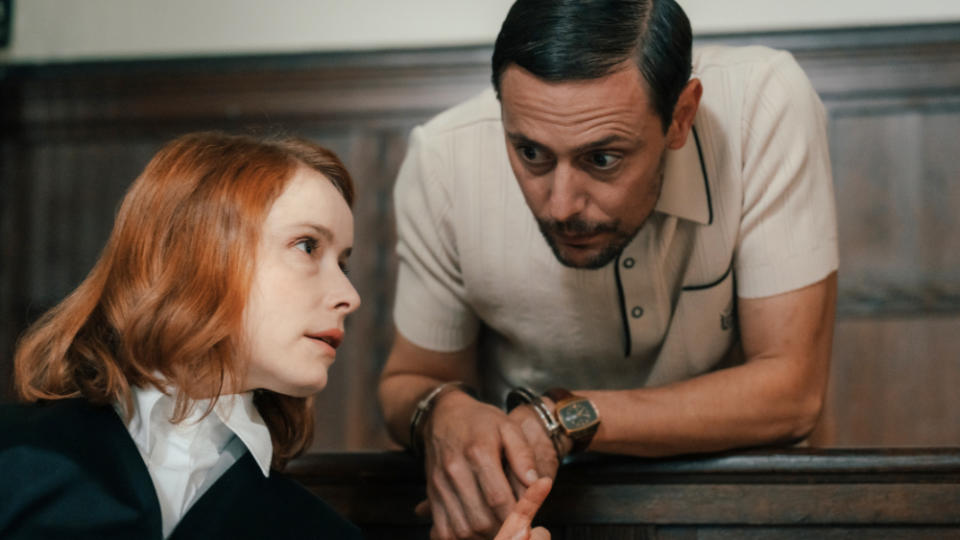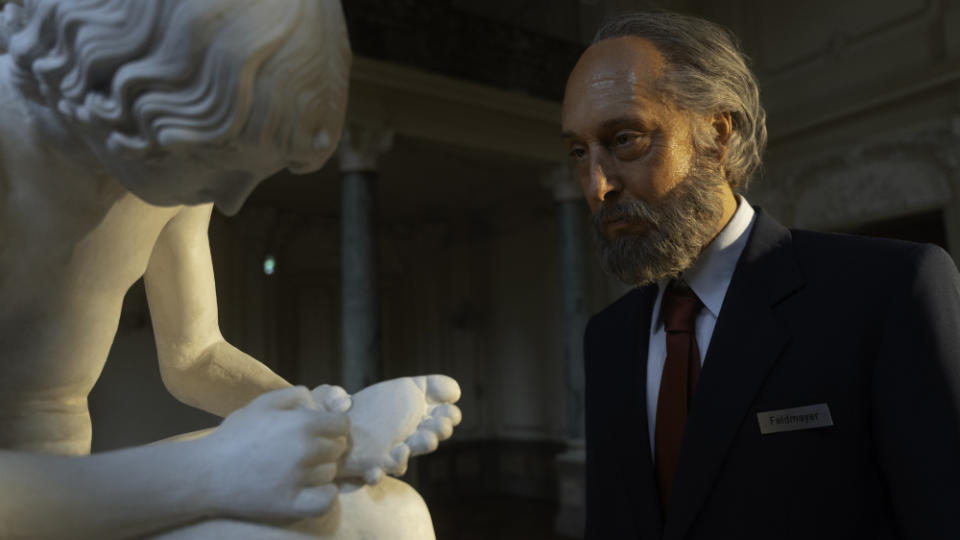Constantin, RTL Plus’ ‘Punishment,’ Broken Down by Ferdinand von Schirach and Oliver Berben

“There is a new studio Star System…but instead of focusing on acting talent (as it did in the 1930s), it prioritizes those with the skills to create new stories, produce new shows and manage the evolution of new character IP…in other words, to make content that will succeed by the measures important in the new world order,” Ampere Analysis’ Guy Bisson announced at MipTV in a presentation.
By that measure, few figures were as important at this month’s buoyant French TV festival Canneseries than German author Ferdinand von Schirach and Constantin TV’s Oliver Berben.
More from Variety
Germany's Bertelsmann Is On a Tight Timeline to Sell France's M6 Group
'Dark Woods' Producers Team on High-Octane Police Drama 'Sonderlage' for RTL (EXCLUSIVE)
WarnerMedia, RTL Deutschland Team Up on 'Two Sides of the Abyss'
Broadcast on ZDF and produced by Berben, 2013’s ”Crime Stories” and 2015’s “Shades of Guilt,” both based on von Schirach best-selling short story anthologies, scored up to 5 million viewers per episode and exceptional market shares of 17%-18%.
Inspired by a von Schirach stage play ”The Verdict” punched almost 7 million viewers and a market share of over 20% on a Monday evening. Aired on ARD as two parallel films, telling the same story from different points of view, ”Enemies” totalled over 10 million viewers on its linear TV premiere, also extraordinary figures.
Produced by Berben for Constantin TV’s Moovie, backed by RTL Plus, and sold by Wild Bunch Television, “Punishment’s” two episodes “The Diver” and “The Thorn” world premiered to a standing ovation at Canneseries.
The six-part anthology may not be everyone’s cup of tea. There are moments of groundbreaking sexual candor (“The Diver”) or numbing recounted brutality (“Subotik”). But, enhancing the brand, it is the kind of compelling, artistically ambitious show which many platforms may want to have on their service accessible to be seen.
There may never before have been such a series showcase for up-and-coming German talent. In “Punishment,” six different movie directors adapt six short stories, five from von Schirach’s latest best-selling anthology of the same title. Beyond the Oscar-nominated Oliver Hirschsbiegel (“Downfall”), all “Punishment’s” directors have broken out in the last decade, some – David Wnendt at Locarno with “Wetlands,” Helene Hegemann at Sundance with “Axolotl Overkill” – to considerable international impact. Co-writers are even earlier in their careers.
“‘The Punishment’” is von Schirach’s ‘Black Mirror,’” says Albin Lewi, Canneseries artistic director. As film and TV mix inextricably, “Punishment” has the best of both worlds, the tensed punch and cinematic style of a movie in each episode, but a series’ ability to sustain the development of von Schirach’s sense of human character, largely a plaything of circumstance and plunged in solipsistic solitude.
The series packs other von Schirach keynotes. It questions – but does not deny – free will which is often stymied or finessed by a character’s past; a ruling in a court of law is one thing, real innocence or guilt another. True punishment may be living with guilt, whether merited or felt (“The Diver”) or come before a crime (“The Thorn”), or not be suffered by the accused or delivered in a court verdict. A person can be charged for a murder they did not commit and walk away scot-free when guilty of homicide.
Few writers have plumbed with such terse and knowing nuance the multiple distinctions between public and private guilt and punishment than von Schirach, a former criminal defence lawyer turned best-selling writer whose “The Allegation,” which he wrote, dazzled 2021’s Canneseries, winning its Dior Grand Prize and best screenplay.

Courtesy of Constantin
Yet formal court justice is better than none at all, von Schirach told Variety at Canneseries. Following selected highlights from an interview with him and Berben and brief details of each episode.
This is the third adaptation, Ferdinand, of your short stories. As a writer, how would you compare “Crime Stories,” “Shades of Guilt” and “Punishment”?
Ferdinand von Schirach: If you write short stories and give them to filmmakers, the story becomes somebody else’s. That is nearly always disappointing. If I write: “A woman with a dog enters a hotel,” we all have different pictures of the woman, the dog and the hotel and and that doesn’t matter for the story, but it matters for the truth. But with “The Allegation,” I was able to write my pictures and the director had to film them. That was the main difference.
So what are the pleasures of writing?
Von Schirach: Writing itself is a sort of home, and I really love to be at home. This is my only hope. That’s the reason why I write. The most important sort of home you probably remember from your childhood. Most people try to go back to their childhood home. If you write something, then you can go back to your childhood, You want to go back to this time where you see everything for the first time. This is the main reason for writing.
Oliver Berben: “Crime Stories,” “Shades of Guilt” and “Punishment” adapt Ferdinand’s trilogy of books, “Crime,” “Guilt” and “Punishment,” referring to the three phases of a trial. We adapted them to a different art form, a series. The first was a six-part miniseries, and the beginning of our friendship. “Guilt” was a completely different set-up, not just in cast but the way we did it, making far more seasons, for example.
And “Punishment”?
Berben: “Punishment” is different again. Lawyers hardly figure in the stories. Each has its own tone. Just as Ferdinand didn’t repeat himself when writing the books, the idea was to find another way of transferring the literary art form into another art form, which is where the idea came up of an anthology: Creating stories from completely different and extraordinary directors. There’s no anchor for an audience of a lawyer taking you by the hand from one story to the next. What takes you by the hand is an idea of punishment, not just in a legal sense but the punishment people deal out to themselves or how society punishes them.
Von Schirach: One miracle of all people is that we can forgive everybody, our wife, our friends and our enemies, but we can’t forgive ourselves. This is the main theme in “Punishment.” Probably you know a scene in your life, and you think about this scene for years and years and years and it informs your character. I try to show this in the short stories.“The Thorn” is one example. You have a thorn in your foot and nobody sees that, only yourself, but it makes you who you are.
One fascinating question in many of the stories is free will. “A Light Blue Day,” for example, moves progressively back in time, throwing focus not on a crime but its causation. The final crime seems nearly inevitable. To what extent can causation be seen as determinism?
Von Schirach: Nobody can escape from themselves, that’s not possible. If you say, however, that we have no free will, which a lot of things seem to confirm, then you might as well give up on our whole society. If there’s no free will, you can’t punish anybody, everything breaks down.
Characters – Andreas in “The Diver,” Katharina in “The Juror” – are marked for life by their first sexual frissons….
Von Schirach: Sexual preferences are like a coin. At first there’s no engraving. Then when you are three years old, you see for the first time your mother putting on her stockings, and that coin is pressed. And that’s that’s for the rest of your life. There’s a woman with great stockings and you say, “Wow, I love stockings. I don’t know why.”
“Punishment” the short stories, rarely interprets, often suggests. Episodes of the series also suggest, but often by different means, cinematic high style, such as Oliver Hirschsbiegel’s anamorphic lenses usage for filming social milieu in “The Diver,” which connote the horrific social pressures bearing down on Katharina, the wife…..
Berben: One of the biggest qualities and challenges in Ferdinand’s writing is the writing itself, the language. It’s very precise, laconic, straight to the point and completely neutral. That’s what makes it so incredibly special. Everything that could form a reader’s opinion is left out. Hirschbiegel’s filming is for me one of the most perfect ways to translate this language. But just using those lenses he gives an opinion and takes whole sequences to another place. Yet, as Ferdinand said, films are a different art form. One succeeds if you are able to push the same emotional buttons but you’ll never be able to adapt fully. And you shouldn’t. It’s an interpretation. An own work of art.
That, of course, is what you were looking for…
Berben: Yes, it begs the question of the whole project’s idea, which was to create an anthology which served as a bouquet of the creative talent and power of across-the-board talent now coming out of Germany. You could do the exactly same thing in the U.K. or France or Italy and use the inspiration of a book like this to have directors or writers express how they work without interference with such stories that are deeply rooted in society. Nobody thought it would get financed. But the stories proved the right stories at the right time, including for RTL Plus.
Von Schirach: The idea, as we first discussed it, was to recreate a kind of 1920s Bahaus Bergstau, when its artists had to show their carpets, or chairs or other furniture at the same time. The idea is to show what directors can do if they’re free, choosing their lead actors, writing their own scripts and selecting camera set-ups. I’m very happy to see these six films because they show what the country can do, if it wants. We’re very grateful for the opportunity. But it’s not…
Berben: Primetime “Columbo….”
But audience ratings is one thing and the image the series projects of RTL Plus another….
Berben: Exactly! Everybody in the creative world will see RTL Plus is doing something like this. All the creatives will immediately sit up and say, “O.K. I want to work for them.”

RTL / Moovie / Luis Zeno Kuhn
One inevitable question, Oliver, is how “Punishment” fits into Constantin production strategy.
Berben: I know what you mean by “strategy” but it’s not the right word. It’s a coexistence of people that have met. Constantin as a company strongly believes in the creative power of people. We’re not so much into strategy. So talent of all types and IP, which is similar to us, is number one. The strategy, if there’s one, is that we consider ourselves as a hub for creatives. We want them to have fun and to be taken seriously with their art when working with us. That’s basically it.
It’s the same for example in Spain where, if a top talent at Movistar Plus wants to make a film, it will make a film.
Berben: That’s exactly the same with Ferdinand and his first book. We discussed for weeks, months. Is it going to be a feature? If so, just one?
Von Schirach: If I could just say, I met Oliver for the first time 13 years ago when I’d published my first book. A lot of producers said they wanted to adapt the book, make a “Shortcuts,” or something like that, what was interesting. Then I met Oliver who said, “I have no idea how to make this.” This was the best answer of all. So we started to have ideas and work together. For me, it’s absolutely perfect. I don’t want to work with anybody else because I want to rely on somebody I trust. Sometimes I have very crazy ideas and Oliver says: “Ah, this is interesting!” And this is wonderful. I’ve love it. So I think we won’t stop.
What’s changed in TV, since you met Ferdinand?
Berben: There were many possibilities when we met. 13 years later, everything is possible.
Can you give an example?
Berben: Ferdinand’s stage play “The Verdict,” a trial turning on a story that happened of a plane that’s hijacked on its way to Munich, and is flown towards the soccer stadium with 70,000 people in it. You have 126 people on board. Is the government allowed to shoot it down? Ferdinand told me about the idea in only three sentences this idea and I went crazy. Then he gave me the theatrical play. I’d never read anything like it before in my whole life. Every sentence, everything was there. It was perfect.
“The Verdict” first came out as a play, right?
Berben: The stage play was hugely successful. So we thought about how to get it to as many people as possible. We made a movie which had one theatrical screening on one day, and it went No. 1 on that day. We exploited it on the internet, linear television, radio, newspapers, all media. The day it came out on [German public broadcaster] ARD I was standing right here at the beach at MipTV and watching Twitter go crazy. Nobody, nobody could have foreseen that, but it happened. There was no strategy – just the idea of a brilliant story that fed into a theater play and us thinking: “O.K., how how can we transfer this to other media”?
Von Schirach: But I have to say, it was Oliver who made that possible. Nobody could imagine people sitting there in prime time and watching a movie which discussed Kant and Jeremy Bentham. This is Oliver. He’s a maker, he makes a success of such little plays. This is one of the reasons I don’t want to go to anyone else because I know his power to make things big. It’s not true that writers write for a drawer. Writers write because they want to be read and seen. And Oliver is wonderful at that.
“Punishment’s” Episodes: a Brief Breakdown
In his writing, von Schirach rarely fully explains. When he does, the sucker punch is all the stronger, as in the final paragraphs of “The Diver” or the confirmation that juror Katharina sees herself reflected in a court case victim.
But his spare, precise, deceivingly matter of fact prose often invites readers to join the dots, considering the elliptical concatenation of events, or finding resonance in seemingly casual dialog.
That implication is taken over in the series by its often cinematic high-style. As “The Thorn” opens, for example, Tabak’s camera focuses on the protagonist at a kitchen table then performs a remarkable 360% summersault to return to him, he table after a different meal. Time has gone by, the central character’s circumstances essentially remain the same, the episode seems to be saying.
A few more details of each episode:
“The Diver,” Oliver Hirschbiegel
Andreas, married to a besotted wife Claudia, sinks ever more into reveries at his adolescent sexual awakening which encourages him to sort to bizarre fetichism sure to spark scandal in his deeply religious Bavarian hamlet. World premiered at Canneseries, the episode sums up the high cinematic style brought to the series, with Hirschbiegel employing anamorphic lenses, an 8o-second dolly shot or 30-second closeup to construct a social horror story and play with audience expectation, as Von Schirach before him. Bernd Lange (“Criminal: Germany“), one of Germany’s top screenwriters, co-writes.
“The Juror,” Mia Spengler
A little girl dances at a posh restaurant, in the thrall of her father, puts on Daddy’s tie when he goes to a business dinner. He abandons her for another woman and she spends her early adult life in the service of her men trying to prove her worth. Until, serving a juror, she rebels. Written by Spengler, whose credits include episodes of Netflix’s “How to Sell Drugs Online (Fast),” and Brix Vinzent Koethe, who received the Fox New Talent Award for his first TV Feature “Karaoke in the Rain.”

RTL / Moovie / Luis Zeno Kuhn
“The Lake House,” Patrick Vollrath
A crotchety loner is driven to murder to preserve the peace and quiet at his lakeside family home, the only place he has known kindness and happiness. An increasingly empathetic and touching treatment from director Vollrath whose 2019 feature debut, “7500,” starring Joseph Gordon-Levitt, was hailed by Variety as an “auspicious calling card.”

RTL / Moovie / Luis Zeno Kuhn
“A Light Blue Day,” David Wnendt
A stylistic tour de force from Wnendt, and by far the episode which spells out if not Von Schirach’s original text, the spirit which informs much of his work. A murder, told backwards, working back in time from the final crime opening the episode scene by scene into the past, so that the audience focuses on the final crime as consequence. Turning the first scene of the preceding sequence in the episode into the last of the one that follows only enhances this impression. The latest from David Wnendt, who broke out with the spellbinding extreme bodily fluid comedy “Wetlands.”
“Subotnik,” Helene Hegemann
A Russian mobster is accused in court by a victim whom he’s half blinded of kidnapping, human trafficking, rape, torture and attempted murder. He’s defended, however, by a principled rookie German-Turkish lawyer who became an attorney, she says, “so that no one will ever be in charge of me again.” But her profession is not what she imagined. A brutal, lacerating episode by Helene Hegemann whose “Axolotl Overkill” caught attention at 2017’s Sundance. Co-written by Esther Preußler, an assistant director and dramaturge at Vienna’s Burgtheater and the Berlin Volksbühne, working with directors such as Thomas Vinterberg.
“The Thorn,” Hüseyin Tabak
Taken from von Schirach’s earlier “Crime Stories” anthology,
A 35-year-old loner Feldmayer, with OCD symptoms, is forced by a clerical error to spend 23 years as a museum security guard staring at the same statue in an otherwise near empty room. The experience changes him, but he may still find redemption. Directed by Tabak (“Gypsy Queen,” “Your Beauty is Worth Nothing”), and maybe the (finally) most uplifting of the six tales.

RTL / Moovie / Luis Zeno Kuhn
Best of Variety
The Best Pop Culture Halloween Costumes for 2022: From 'House of the Dragon' to 'Euphoria'
Constance Wu Gets Candid in Revealing New Memoir 'Making a Scene'
Sign up for Variety’s Newsletter. For the latest news, follow us on Facebook, Twitter, and Instagram.


